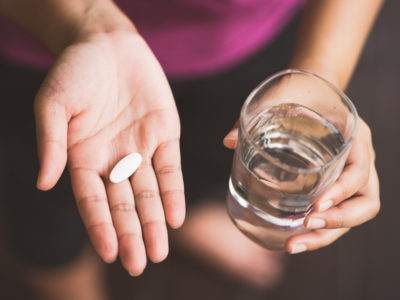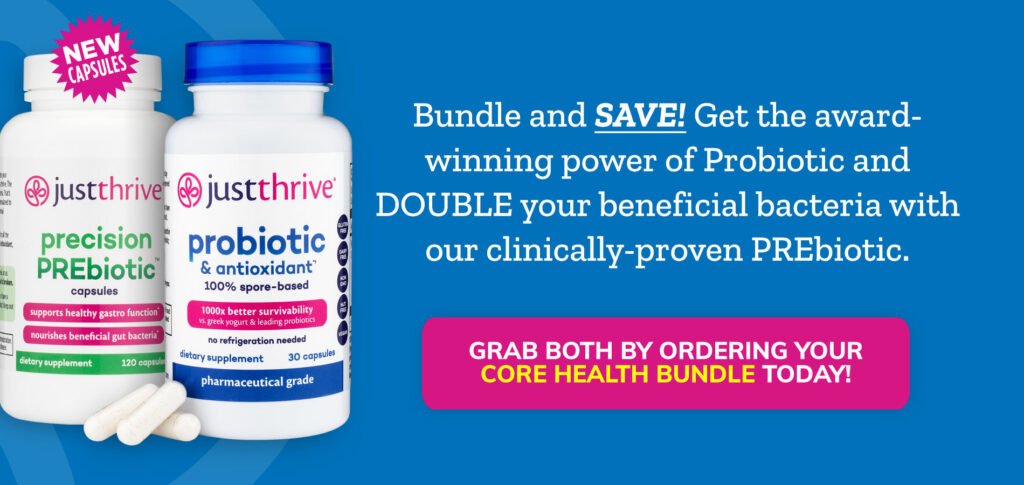Table of Contents[Hide][Show]
If you’re part of the wellness community, then you’ve probably been reading about probiotics for years. Then along came their companions, prebiotics. Together, they formed a power duo for a healthy gut.
Now, a new “biotic” is emerging on the wellness scene: postbiotics.
More and more studies are pointing to the crucial role that postbiotics play when it comes to improving and maintaining your overall health. In fact, some of the positive effects of probiotics might easily be attributed to postbiotics, instead.
So what exactly are postbiotics, and how do they differ from the others? And more importantly, how can you be sure that your body is getting enough of them?
Breaking Down the Different “Biotics”
Probiotics. Prebiotics. And now, postbiotics. These three terms refer to very different substances, but with such similar names, they could be easily confused.
Let’s take a look at each of them to better understand how they work as a team to support your health and wellbeing.
Probiotics
Probiotics are bacteria found in food, drink, and supplements that are identical or very similar to the beneficial bacteria already living in your gut.
When you consume probiotics, they join forces with the beneficial (“good”) bacteria living in your gut, boosting their strength and their numbers. The flourishing colonies of good bacteria take up so much room in your gut that they crowd out the pathogenic (“bad”) bacteria.
Probiotics are crucial in creating a healthy balance in your gut microbiome, which improves your physical, emotional, and mental wellbeing.
Prebiotics
Prebiotics are compounds (mostly fiber) that serve as a food source for probiotics.
Prebiotics can’t be digested by your body. They won’t be absorbed or assimilated as they travel through your digestive system, so they end up arriving intact in your gut.
Once there, prebiotics are broken down by your gut bacteria. Ideally, the prebiotics you consume are precision prebiotics, meaning they are broken down by the beneficial bacteria but serve no real purpose for pathogenic bacteria.
Postbiotics
And now here comes the newest group of biotics—postbiotics.
So what are postbiotics?
Postbiotics are the substances created by your body when it breaks down probiotics or prebiotics.
Some healthy postbiotics include nutrients such as:
- Amino acids
- Vitamin B
- Vitamin K
Antimicrobial peptides are also a common postbiotic. These substances hinder the growth of pathogenic bacteria, leaving more room in your gut microbiome for the colonies of beneficial bacteria.
Another type of postbiotic substance is short-chain fatty acids (SCFAs), which encourage the colonies of beneficial bacteria in your gut to thrive. One specific SCFA produced as a postbiotic is butyric acid.
Research shows that butyric acid targets beneficial bacteria, feeding them and allowing them to flourish. It can help improve digestive issues, immune response, inflammatory conditions, and more.
Related
Your Complete Guide to Vitamin K2 (MK-7)
Learn how vitamin K2 MK7 differs from vitamin K1 and discover its functions and benefits, signs of deficiency, and how you can incorporate it into your daily diet.
Types of Postbiotics
There are several different categories of postbiotics:
- Bacterial lysates (medicine made from broken-down bacteria)
- Cell-free supernatants (substances produced by bacteria and yeast)
- Cell wall fragments
- Enzymes
- Exopolysaccharides (secreted by microorganisms)
- Lipopolysaccharides (found on the outer layer of bacteria)
- Metabolites such as vitamins and amino acids
- Short-chain fatty acids (SCFAs)
Since everyone’s gut microbiome is unique, the postbiotics produced by your body may be vastly different from those produced by your sibling or significant other—even if you eat an almost identical diet!
And, the benefits you receive from postbiotics will vary, depending on which ones are present in your body.
Let’s take a look at some of the potential benefits of postbiotics.
The Benefits of Postbiotics
The nutrients and other substances produced as postbiotics have numerous benefits for your overall health.
Let’s explore some of the most common benefits of postbiotics.
Ease Gastric Issues
Postbiotics can help with digestive conditions, particularly constipation and diarrhea-predominant irritable bowel syndrome (IBS).
According to one study, participants taking postbiotics for four weeks saw significant improvements in bowel movement frequency, bloating, and pain.
One particular postbiotic, butyrate, is known for its gut-healing properties. Butyrate acts as a food source for the cells lining your colon (colonocytes). Research shows that butyrate can reduce inflammation in your gut lining, prevent leaky gut, encourage gut motility, boost your metabolism, improve brain function, and even lower the likelihood of colon cancer.
Improve Immune Function
As surprising as it may sound, 70% to 80% of your immune system is found in your gut. So the postbiotics produced in your gut microbiome have an enormous impact on your immune function, as well.
- One study showed that increasing postbiotic intake significantly reduced the development of a common cold.
- Another study showed that postbiotics can prevent recurring respiratory tract infections.
Along with the postbiotic foods we suggest below, supplements containing postbiotics are an excellent way to strengthen your immune system.
We recommend this immune supplement from Just Thrive. It contains a combination of fast-working, immune suppporting ingredients, including minerals, polyphenols, herbs, and postbiotics.
Together, these powerful components activate your body’s strongest fighters in the battle for good health, such as:
- Natural killer (NK) cells, which help protect against both infectious pathogens and disease
- Macrophages, specialized cells that detect and destroy bacteria and other harmful organisms
- Dendritic cells, the ‘sentinels’ of the immune system which initiate your immune response.
Lower Blood Sugar/ Prevent Obesity
Research shows that one particular postbiotic, known as muramyl dipeptide, can improve insulin resistance and glucose tolerance.
Another study shows that butyrate also plays an important role in managing your blood sugar.
By regulating blood sugar levels, these postbiotics can play an important role in fighting Type II Diabetes.
Related
Probiotics for Diabetics: How Your Gut Microbiome Helps Maintain Healthy Blood Sugar
Probiotics for diabetics can make a big impact in managing and even preventing this disease. Learn how probiotics help maintain healthy glucose levels and blood pressure, improve insulin sensitivity, promote heart health, and more.
Reduce Allergy Symptoms
Allergic reactions occur when your immune system is sent into overdrive. Postbiotics might help improve your immune response by decreasing allergic reactivity.
One study shows that postbiotics can help relieve one of the most common allergy symptoms, a runny, stuffy nose (rhinitis).
Another study showed that postbiotics were effective in reducing another common allergic reaction, atopic dermatitis—commonly known as eczema.
Relieve Colic
Colic is frequent, intense, prolonged crying or fussiness by an otherwise healthy baby. Typically, it is diagnosed when a baby cries three or more hours per day, three or more days per week, for more than three continuous weeks.
One recent study shows that postbiotics, in the form of fermented milk, can be an effective relief for colicky babies.
Postbiotic Foods
As you can see, postbiotics play an important role in your overall health. So for optimal wellbeing, you want to make sure you’re getting enough of them.
One way of getting more postbiotics in your system is through your diet.
If you’ll recall, postbiotics are produced when your gut bacteria break down prebiotics and probiotics. By consuming more foods containing those two substances, you’ll increase the number of postbiotics, too.
Fermented Foods
Most probiotic-friendly foods and drinks are fermented. Adding more of these to your diet will boost their postbiotic output.
Some of the most common probiotic-rich fermented foods and drinks include:
- Kefir
- Kimchi
- Kombucha
- Miso
- Sauerkraut
- Tempeh
- Yogurt
Fiber
Dietary fiber is a prebiotic, broken down and used for fuel by the beneficial bacteria in your gut. When you eat food high in fiber, the colonies of good bacteria strengthen and grow, resulting in a higher production of postbiotics.
Fiber is found in many healthy foods, including:
- Fruits: apples, apricots, bananas, kiwi, pears, and raspberries
- Nuts
- Seeds
- Vegetables: artichokes, asparagus, broccoli, carrots, chickpeas, garlic, green peas, leafy greens, onions, potatoes, turnip greens
- Whole grains
Related
Fiber 101: An In-Depth Guide
Learn the difference between soluble and insoluble fiber, the best way to add it to your diet (as well as what to avoid), and some of its biggest health benefits of fiber.
Potential Side Effects of Postbiotics
Since postbiotics are produced when you consume some incredibly healthy probiotic-friendly foods, the drawbacks are very few. Most healthy people will have little, if anything, to worry about.
However, if you’ve never eaten a probiotic-rich diet, you may notice a few side effects at first. In particular, you may notice some mild digestive issues, such as gas, bloating, or mild discomfort.
As with any new diet, once your body adjusts, the side effects should fade away fairly quickly.
However, some groups may be more likely to experience negative side effects, including:
- People who recently had surgery
- People with structural heart disorders
- People who have digestive tract disorders
- People who are pregnant
- Children
The groups above tend to have a weaker immune system, leaving them more susceptible to any sort of side effects.
If you fall into these categories, you should talk to your physician before beginning a probiotic-heavy diet (or any other diet!)
Final Thoughts
Good health begins in your gut with the right bacterial balance. There are three essential “biotics” that can help you achieve your wellness goals: prebiotics, probiotics, and postbiotics.
Postbiotics are produced by your body when it breaks down prebiotics or probiotics. Far from being biological waste, postbiotics contain vital nutrients, enzymes, SCFAs, and other substances that boost your overall health and wellbeing.
Although postbiotics are the newest and least-explored of these, they are quickly gaining more attention, thanks to their many health benefits.
And, postbiotics are surprisingly easy to produce in your body. With some delicious, healthy foods containing prebiotics that can be bought right from your favorite grocery store, you can power up your postbiotics and make sure your body is at its healthiest prime!
You May Also Like…







